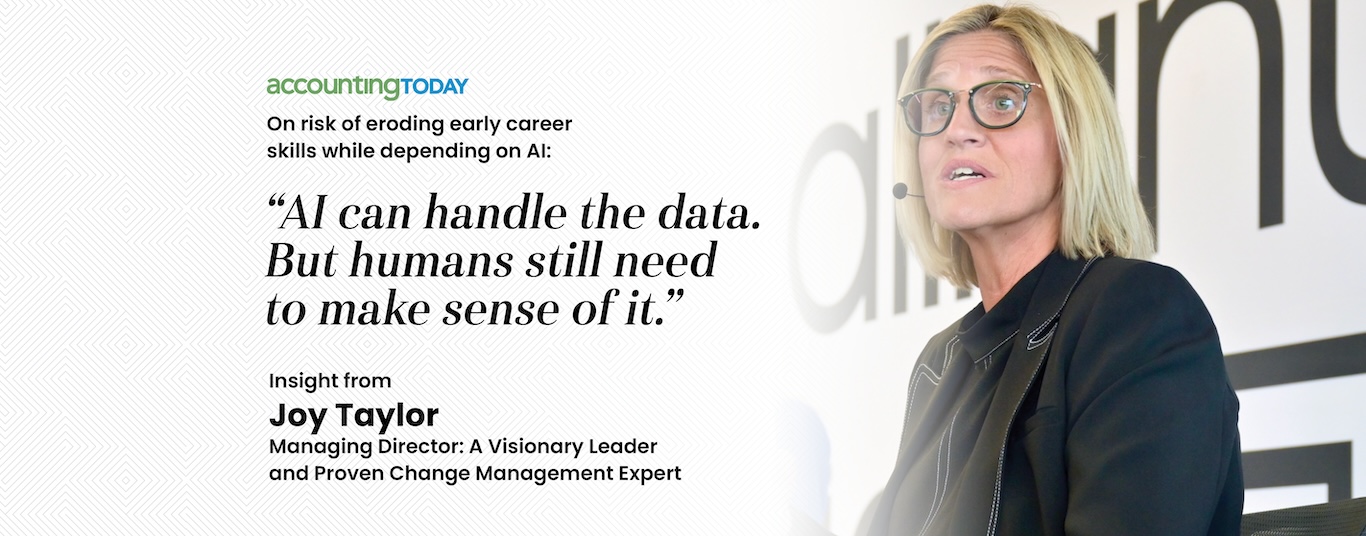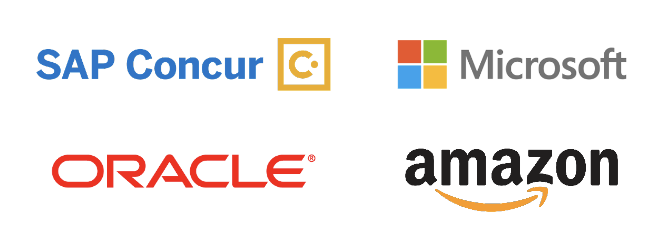AI is increasingly taking on the routine repetitive tasks that, in the past, were handled by entry level accountants. This has allowed firms to expand their capacities without growing headcount, as well as transition out of mundane compliance services and into higher-level work that relies more on human judgment. At the same time, this has raised questions as to how the new generation of accountants will develop the foundational skills necessary for this higher level work if they no longer handle the simple tasks that AI now does.
While no one exactly liked processing 1099s assembly line style or spending all day on bank recs, it was generally how newer accountants built the knowledge and experience that enabled them to eventually take on more complex work. As AI took on more and more, though, the accountant has gone from performing these menial tasks themselves to vetting the AI’s work and analyzing its data. But Joy Taylor, managing director of consulting for Texas-based advisory firm alliant, wondered if accountants have no experience doing this work, how well can they understand and evaluate the AI’s results.
“I do believe that technology and AI will [assist with many of] those transactions, but it will still be critically important for those that inherit the output of those digital results to interpret them and confirm that they are correct, and that is the skill that still requires a great deal of knowledge, careful consideration and an investment in education,” she said.
While Taylor was careful not to dismiss the importance of AI and the positive role it can play in the accounting world, she said professionals still must cultivate and maintain foundational skills in order to remain effective. If new accountants are no longer developing those skills, she warned, it could end up exacerbating, not solving, the pipeline issue.
“If you avoided teaching and training the entry level capabilities, it would be very disruptive, I would think, to any profession,” she said.
This is something that Avani Desai, CEO of top 50 firm Schellman, has thought about as well. She’s seen smart and eager professionals who have never done a reconciliation by hand, built a pivot table from scratch, or tested a control matrix line by line. She agreed that no matter how good AI might get, foundational skills for humans remain vital.
“You can’t expect someone to review a complex K-1 if they’ve never touched a 1099, you have to actually go build that muscle memory first,” she said.
Yolanda Seals-Coffield, PwC U.S.’s chief people and inclusion officer, made a similar point. Generally one does not expect a surgeon to do heart transplants when they’ve never even stitched a cut. That surgeon would first need to practice on animals and then perhaps a cadaver before being trusted to work with a live person. This is not so much because we expect the surgeon to always do the stitching, but because we expect them to understand what makes a good stitch. She compared it to her own experience as a lawyer: it’s less doing the ‘what’ and more understanding the ‘why.’
“I’m a lawyer by trade, and I remember in the early days of my career sitting in large rooms surrounded by files, doing discovery, digging through documents, putting stickers on the documents. By the time I left law firms, that work was being done by computers, [but] I still had to understand why those documents were critical, why discovery mattered, why that process mattered, even if I didn’t have, you know, the paper cuts to show for the work that I had done.”
Atif Zaim, deputy chair and managing principal-elect for KPMG U.S., said that regardless of how someone gets those foundational skills, they’re still important for building later skills. He noted that he began doing basic things like bank reconciliations and fixed asset depreciation before moving on to the more complex work that eventually put him where he is now. He pointed out that this is the case even at the very basic level.
“I have kids in high school. I’ve been involved in their education, and it’s interesting. Now you can have a calculator on every exam. But they were first taught how to do it manually,” he said.
A loss or a change?
Others, though, are not entirely sure. Yes, perhaps accountants today don’t do as many basic tasks as they used to, but does that really mean they’re losing skills? No one disputed that foundational skills are important, but not everyone thought automation and AI represented an especially dire threat against them. Further, there were questions as to whether performing basic tasks for years is really the best way to build those skills in the first place.
Hrishikesh Pippadipally, chief information officer at top 100 firm Wiss and Co., said some of the more old school partners at his firm were once concerned about skill degradation when optical character recognition technology came out, saying things like “how are these kids going to know how to do tax return if they don’t know where the numbers go in the boxes.” Years later, OCR has become commonplace and, Pippadipally said, people still know how to process tax returns.
“No one stopped knowing how to do a tax return because now we have OCR technology,” he said, adding that “the key is really just leaning into these technologies and all that it’s going to be able to afford us: helping us save the time worrying about where the numbers go, and giving us more time to think about why the numbers are there.”
Douglas Slaybaugh, a CPA career coach as well as the Chief Growth Officer for agentic AI solutions provider uiAgent, said offshoring, too, takes care of routine menial tasks so in-house accountants can focus on higher level work, and has been around much longer than AI. But the profession, instead of losing its foundational skills, adapted. Firms still use offshoring all the time, and they’re still standing. This is because, in his view, one does not necessarily need to have done a process over and over again for years to understand how it works. He compared it to his car.
“I drive a car. I have no idea how to fix my engine. I don’t know what those pistons do, I don’t know what those valves do, but I can still drive the car. These staff, they don’t have to know how the engines are built. They don’t have to know where every single detail is coming from. What they have to be able to do is use the information that AI is providing them.”
In this respect, he said it’s not so much that foundational skills are degrading but, rather, what counts as a foundational skill is starting to shift, as it has several times before. He noted that he didn’t get to be in front of the client until he was a senior manager, and until then was constantly told “no, no, we’ll go talk to the client, you stay in the conference room or stay in the office. We’ll go have the client conversation.” Now that entry-level accountants aren’t generally spending years and years with the kind of work now handled by AI, they can get in front of the clients and play a more strategic role earlier than before.
“A lot of those things, they get to start learning and developing earlier. We don’t just save it until they reach a certain level now, and the benefit is felt mostly at the top, the partners, because they get to leverage more and delegate more, because they have more skilled, more available resources below them than they’ve ever had.”
Stephanie Ringrose, a partner with California-based Navolio and Tallman, also raised the point of offshoring and outsourcing, noting that it also took care of routine work. She added that while foundational skills are important, she wondered how much people were really getting them from manually keying in data over a long period of time. She echoed many in saying that what’s more important is to understand why something is done in the first place.
“Kind of like the bank reconciliation. You need to know how it’s done, why it’s done, to fully appreciate that the technology is assisting you with that piece, but also [need] to evaluate that just because we’re using AI technology, it doesn’t necessarily mean that that is also the right answer. You know, it’s not just but blindly relying on it, either. … And so you have to understand some of the basics to evaluate it. But again, I don’t know that you have to do it so many times to get there,” she said.
Desai, from Schellman, agreed that the baseline technical skills may not be as important as they were before automation and AI. However, performing such tasks is not just about knowing how to fill in a tax return, for example, but the ability to understand and contextualize the return—also known as critical thinking. This, too, is a baseline skill that Desai worries is starting to get lost as well.
“Maybe technical skills aren’t what you should be looking for. You should be looking for people who are curious and adaptable, not just technically proficient. I want to hire people who are asking ‘why does this work this way?’ not ‘what button do I click right and when?'” she said.
Pippadipally raised a similar point. As AI and automation take over more basic tasks, critical thinking will be more important than ever. He believes it will be less important to fill in the tax form and more important to know what the tax form means and how it fits within the context of the client’s particular circumstances.
“As the AI starts to replace the [routine] work that we’re doing, what you end up having more time for is the ability to analyze, supervise, and be a trusted advisor with your clients. So you need to be analytical, and you need to lean into the tools to understand what’s out there so that you can use those tools to service your clients, and you need to be able to engage with your clients in a personable way,” he said.
Taylor, from alliant, agreed that human judgment and intuition have become more important in the age of AI and automation and, indeed, understanding technology has become essential for any accountant who seeks to advance their career. Several times she stressed that her concerns regarding foundational skills is not a call to action against AI in accounting. Indeed, it is the opposite: a firm cannot use AI to the best of its ability without underlying knowledge of what it is doing in the first place.
“So I don’t want to ever underestimate the importance of that and how AI will play a role in working smarter… versus doing all the heavy lifting. But those are skills that must be cared for and learned no matter what they get into,” she said.













